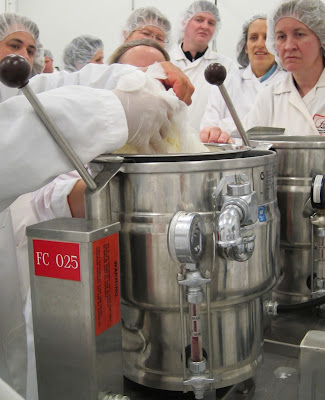Artisan Cheese-Making in Saskatchewan
 Travel in Europe and you are immediately struck by the number and variety of local cheeses, but then you come home to Saskatchewan and there are next to no local artisan cheeses, but that situation is about to change. (Salayview Farm south of Regina has just started making an excellent fresh goat cheese.)
Travel in Europe and you are immediately struck by the number and variety of local cheeses, but then you come home to Saskatchewan and there are next to no local artisan cheeses, but that situation is about to change. (Salayview Farm south of Regina has just started making an excellent fresh goat cheese.)The course was led by Margaret Morris of Glengarry Cheesemaking and Erin Hiebert, the Food Centre’s Manager of Skills Development and Food Safety Programs, while Brev Chesky, the Centre’s Processing Director, assisted with the hands-on portion of the workshop. I was fortunate to join the class at the end of the workshop and to get a first-hand glimpse at the cheese-making process as well as to meet some of the participants.
The Course
Margaret Morris is the owner of Glengarry Fine Cheese in Lancaster, Ontario. She also operates Glengarry Cheesemaking, which sells the equipment and supplies needed to make cheese.
The course combined classroom sessions with hands-on experience making five different kinds of cheese, and participants were excited by how much they had learned. “They were wonderful instructions for kitchen cheese-making,” Murray Gray of Aylsham Fruit and Vegetables said. “Margaret gave us all the techniques you need and explained how to use the cultures and starters to create different flavours and textures.”
 Using milk from the University Farm, the participants made camembert, feta and mozzarella cheeses on the first day. “These are uncooked cheeses,” Ann Smith, Agriculture Council of Saskatchewan, explained. “You add culture to the milk, let the enzymes work for a bit, and then add rennet to make the curds.”
Using milk from the University Farm, the participants made camembert, feta and mozzarella cheeses on the first day. “These are uncooked cheeses,” Ann Smith, Agriculture Council of Saskatchewan, explained. “You add culture to the milk, let the enzymes work for a bit, and then add rennet to make the curds.” On the second day, the participants made cheddar and gouda, which are both cooked. You need at least 12 litres of milk to make a batch of cheddar as you need the weight to create a supple, even texture.
I was amused when Margaret took a French fry cutter in order to slice the cheddar into curds. She then added salt, and we were immediately able to sample the curds. They were delicious with a light but distinctive flavour.
One woman, who is from Quebec, said that her family loves poutine. She came to the course to learn how to make fresh cheese curds to serve with poutine and was delighted as the curds tasted just like she remembered. Mission accomplished.
Hobby or Commercial
Some of the participants were interested in making cheese at home for their families. Others were hoping to start selling it.
“The cheese you buy is so expensive, and it doesn’t always taste good,” Ann Smith said. “My mother made cheese when I was growing up as we had our own cows. I definitely plan to go home and make it. You don’t need any special ingredients – just culture and store-bought milk.”
Debbie Janzen and Murray Gray sell fruit and vegetables at the Prince Albert farmers’ market and Co-op and are hoping to start selling cheese. “We could make it in the winter, and it would be aged and ready for the farmers’ market in the summer,” Murray says. “The regulations are not that cumbersome, and the Food Centre supplies everything you need.”
Lois and Clayton Jack of HollyHock Market in Mortlach are also considering starting to sell cheese, and a group of people from near Saskatoon are also exploring the possibilities.
Three Saputo employees participated in the course as they were interested in learning more about the science and the practice of making cheese on a small scale. “They shared lots of information,” Sara Lui, the Food Centre’s Product Development Manager said. “It was good networking.”
The Viability of Artisan Cheese Production
The Food Centre is a valuable resource for small Saskatchewan producers who are able to use the Centre’s certified facilities to make a wide range of products. Erin Hiebert, the Centre’s Skills Development and Food Safety Manager, says that they have the equipment to prepare 100 litre or smaller batches of cheese.
Margaret Morris says that she works with customers whose production size ranges from 100 to 5,000 litres per day or per week. “Cheese-making requires really dedicated personnel who are prepared to commit time, capital and marketing,” Margaret says. “But if you’re on a farm, it has good potential for increasing the value of your farming business.”
The best of luck to all the participants as they go home and start trying their hand at making cheese. I look forward to tasting the end product.
Upcoming Food Centre Workshops
The Food Centre will be offering a series of industry workshops in 2012. The next one is scheduled for March and will cover Fluid Bed Drying, Granulation and Agglomerations.
See also:
Cheese, Glorious Cheese
Bulk Cheese Warehouse
Saskatchewan Food Industry Development Centre Inc.
Little Qualicum Cheeseworks, Vancouver Island
Charelli's Cheese Shop and Delicatessen, Victoria, BC
La Formatgeria la Seu, Barcelona, Spain
P.S.You need to put pressure on the cheese so that it will settle and have an even texture. If you don't have weights, you improvise.





Comments